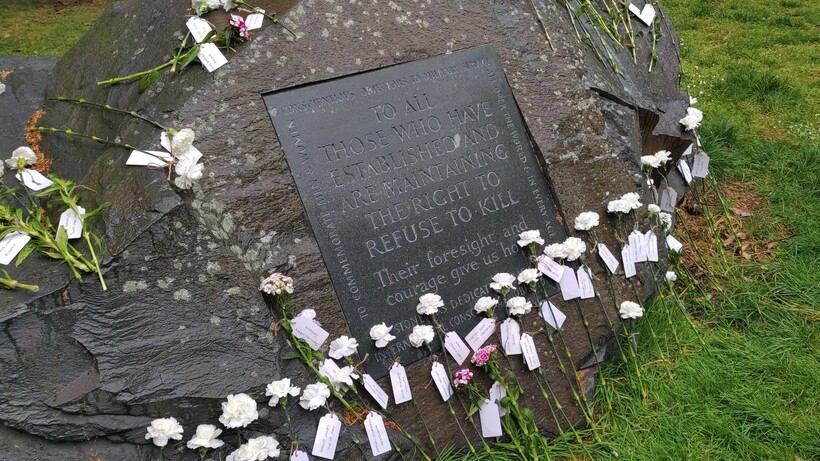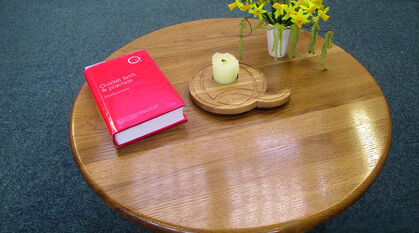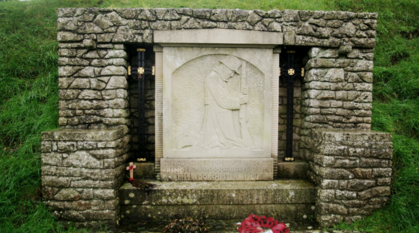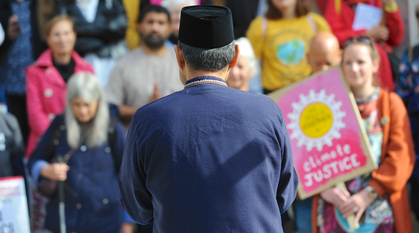Heeding the voice of conscience: a call to continued action
Ellis Brooks reflects on the message of International Conscientious Objectors' Day and the call to renounce violence in all its forms.

On 15 May we marked Conscientious Objectors' Day. At one of the ceremonies around Britain, I joined people gathered in Tavistock Square, London to hear music, poetry and testimony in the leafy gardens where the conscientious objection memorial stone rests. We laid flowers for all those who refused to kill. You can watch a recording on the Peace Pledge Union website.
A moment to reflect
In some ways the continuity of an annual event like this is comforting. Every May there is a gathering. It's a moment to reflect and learn.
I remember the first time I attended, about one year after I started working for Quakers in Britain. One of the speakers told the crowd about Maximilianus, a Numidian Christian who refused to join the Roman army in the third century. He was executed for refusing to kill but we can still remember Maximilianus and the numerous, nameless people like him going back through history.
At the 2016 event voices echoed a century on from the Military Service Act in World War I, which introduced conscription. British pacifists faced persecution but won the right to conscientious objection in law. This year Michael Mears, playwright and our MC, shared the WWI objector Bert Brocklesby's recollection of an exchange with a fellow prisoner in Maidstone.
“Well blow me – they put me in here for killing someone, but they put you in here for refusing to kill someone!"
Reflecting on stories like Bert's in the White Feather Diaries (website no longer available) showed how challenging and complicated conscientious objection could be in the face of social stigma, tribunals, imprisonment and forced labour, let alone the ethical quandary. I feel grateful to those who wrought the right that means I've never been called on to kill.
Alive to what's happening in the world
But CO Day is also alive with what's happening at the time, which should be uncomfortable. Every year it's different depending on what's happening in the world. Conscientious Objectors' Day must have had a particular resonance in May 2003, when thousands of British troops had already been deployed to Iraq for 8 weeks. Or 2006 just 10 months after a bomb destroyed a bus in Tavistock Square itself, killing 13 people.
I remember being particularly moved by two Yemeni students speaking about their anguish in 2019, being in London but knowing their country was suffering. British weapons and support for the Saudi coalition were and are part of the arsenal tearing their country apart.
This year Semih Sapmaz of War Resisters' International shared the persecution and danger people face today for refusing military service in countries such as Turkey, South Korea, Israel, Singapore, Eritrea, and Colombia. He stressed how essential solidarity is for these objectors.
Sahar Vardi, an Israeli conscientious objector who served three prison sentences, reminded us that 15 May is also remembered as Nakba Day – how Palestinians refer to their dispossession in 1948. Palestinian and Israeli conscientious objectors can face stigma and the pressure that comes from such prolonged injustice.
Right now, Palestinians face their largest expulsion and forced transfer since the start of the occupation of the West Bank. Take action with EAPPI UK & Ireland.
Conscription and conscience
This year, inevitably, Ukraine is on all our minds. Both Ukraine and Russia practice conscription. Both have conscientious objectors. Semih shared statements from the Ukrainian Pacifist Movement and the Russian Movement of Conscientious Objectors.
“The Conscientious Objectors' Movement calls on the Russian soldiers not to participate in hostilities. Do not become war criminals." – Russian Movement of Conscientious Objectors to Military Service
Indeed, it is worth remembering Russia has a long history of pacifism; from the time Leo Tolstoy and the doukhobors, who were compared to Quakers, to the mothers who organised to save their children from being used as cannon fodder in Chechnya and now Ukraine.
Being a conscientious objector today
With Russia's invasion of Ukraine, Britain has been vocal. It can take a stance on the war and send weapons to the region (no complaints from the arms industry!) but, excepting British Russians and British Ukrainians, it is not 'our blood' on the line. We're not being conscripted to kill in person. Does that mean our consciences are free?
Sahar said, “Conscientious objection is first being conscious to what is happening around you, then objecting to that mechanism of war."
If violence is to end, we are required to renounce violence. But violence can be indirect, structural.
The concept of conscientious objection, so relevant to both war and refusing to kill, can provoke other challenges for us in this joined-up world. What else should our consciences be alert to? The things we participate in, the things we remain silent about, the things we don't even notice can all be a form of conscription if we let them. What have we been quietly conscripted to?
Our decisions about money and consumption, our responses to inequality and marginalisation in our society, or bullying and exclusion in our immediate communities or even families. We're surrounded by situations that ask us, what does our conscience speak?


